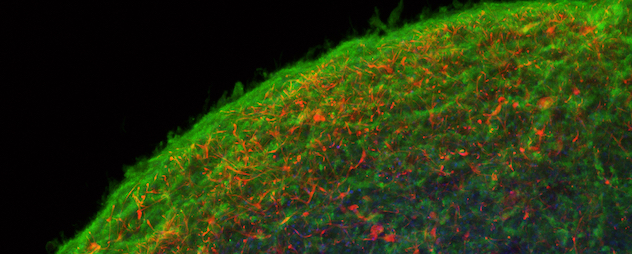-

Using animal models to understand disease
The goal of research in Dr. Zhao's lab is to study the functions of APOE, APOE receptors, and TREM2 during disease development using models such as genetically altered mice, including conditional knockout, knockin and transgenic mouse models.
-

Human iPSC-derived models mimic disease
The Neurobiology of Alzheimer's Disease and Related Dementias Lab uses the induced pluripotent stem cell (iPSC) model system to generate human cellular models from patients with diverse genetic backgrounds to characterize disease mechanisms.
-

Potential of 3D human organoid models
The lab aims to uncover the mechanisms that lead to Alzheimer's disease and related dementias using iPSC-derived organoid models.
Overview
Na Zhao, M.D., Ph.D., leads the Neurobiology of Alzheimer's Disease and Related Dementias Laboratory at Mayo Clinic. The lab's research centers on understanding the physiological and pathological functions of apolipoprotein E (APOE) and triggering receptor expressed on myeloid cells 2 (TREM2) in aging and aging-related diseases and disorders. Specifically, Dr. Zhao's lab focuses on dissecting the molecular and cellular mechanisms underpinning the pathogenesis of Alzheimer's disease (AD) and Alzheimer's disease-related dementias (ADRDs) such as Lewy body dementia (LBD).
The roles of APOE and APOE receptors, such as the low-density lipoprotein receptor-related protein 1 (LRP1) and microglial function through TREM2, are highlighted. By targeting APOE, TREM2 and related pathways, the lab's research team hopes to develop unified therapies that provide disease-modifying benefits to multiple neurodegenerative diseases in the future.
The lab uses genetically altered mice, including conditional knockout, knock-in and transgenic mouse models, along with human induced pluripotent stem cell (iPSC)-derived models. These are helpful for studying the functions of APOE, APOE receptors and TREM2 in brain lipid metabolism, signal transduction, synaptic plasticity, and the pathogenesis of amyloid-β (Aβ), tau and α-synuclein.
The Neurobiology of Alzheimer's Disease and Related Dementias Lab collaborates with several labs within the Department of Neuroscience at Mayo Clinic in Jacksonville, Florida. The lab also works with researchers from Mayo Clinic's Alzheimer's Disease Research Center, which spans Mayo Clinic's campuses in Rochester, Minnesota, and Jacksonville, Florida.
Funding
The National Institutes of Health, the BrightFocus Foundation, the Coins for Alzheimer's Research Trust (CART) and Mayo Clinic's Alzheimer's Disease Research Center provide funding for Dr. Zhao's lab.
Research focus areas
- APOE and APOE receptors in aging and AD. Dr. Zhao's lab explores the roles of APOE and its receptors in modifying the aging process and AD development. The team seeks to understand why APOE2 contributes to longevity and protects against AD, whereas APOE4 is the strongest genetic risk factor for late-onset AD.
- APOE and APOE receptors in LBD. The lab investigates the role of APOE and APOE receptors in the development of LBD, including seeding and spreading of α-synuclein.
- TREM2 in AD and ADRDs. Dr. Zhao's team examines the dynamic functions of TREM2 and immunoregulation in the process of AD and ADRDs.
About Dr. Zhao
Na Zhao, M.D., Ph.D., is an assistant professor of neuroscience at Mayo Clinic College of Medicine and Science in Jacksonville, Florida. Dr. Zhao's research focuses on understanding the biology and pathobiology of APOE, APOE receptors and TREM2 in AD and ADRDs. She is passionate about innovative translational medicine that aims at developing targeted therapies to address unmet patient needs.